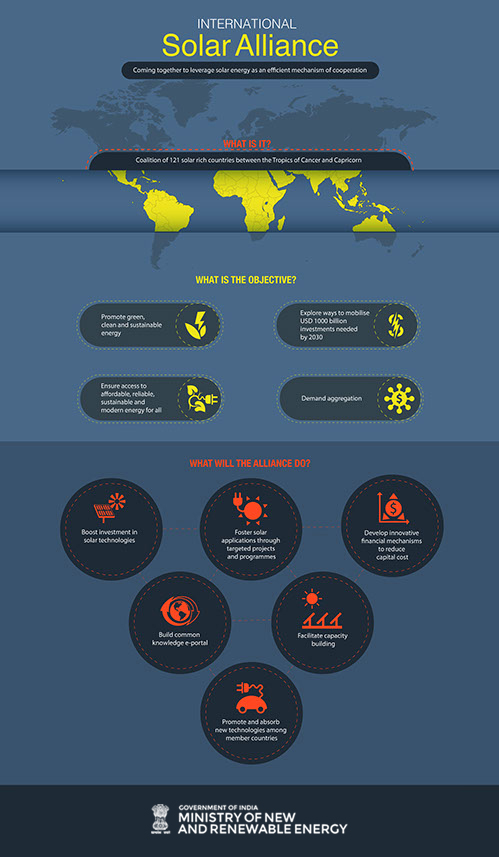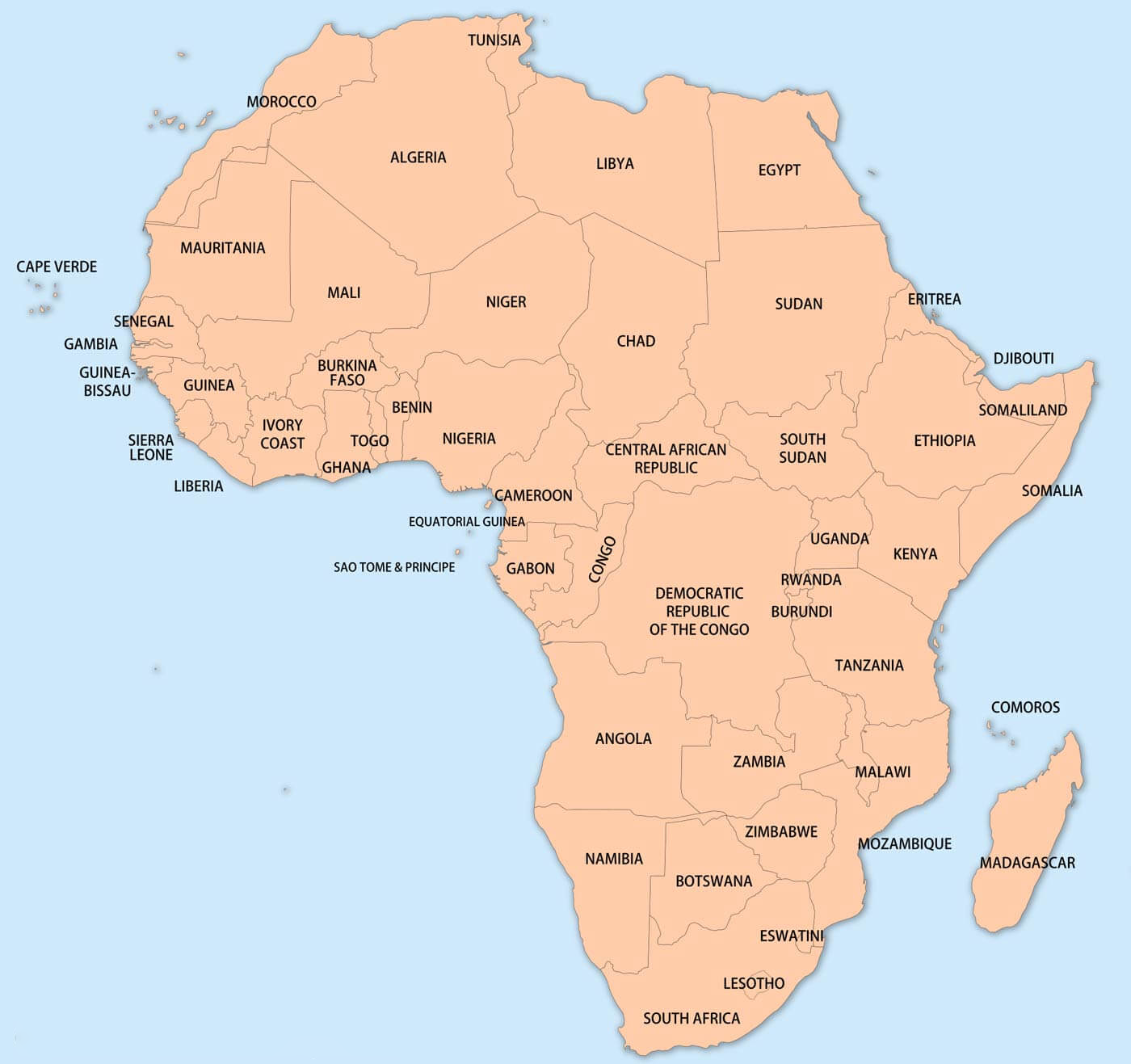India’s Interests in Africa's RE Potential | 01 Sep 2023
For Prelims: International Solar Alliance (ISA), Renewable Energy, Solar Energy
For Mains: Africa: A Potential Global Leader in Renewable Energy, Importance of Africa for India
Why in News?
Recently, the International Solar Alliance (ISA) held its 5th regional meeting in Kigali, Rwanda. Nine solar power demonstration projects across three countries: 4 in Uganda, 2 in Comoros and 3 in Mali, were virtually inaugurated in the meeting.
- During the meeting, a report titled "Roadmap of Solar Energy for Universal Energy Access", was unveiled.
What are the Key Highlights of the Report?
- The report outlines a strategic approach to effectively and economically tackle the global energy access challenge using solar-powered solutions. It encompasses case studies, real-world examples, and innovative policies aimed at bringing about a transformative shift in the implementation of solar mini-grids.
- The report's conclusions hold significant relevance for Africa, especially the Sub-Saharan region and rural areas. It identifies a range of electrification strategies centred on solar energy, particularly focusing on solar mini-grids and Decentralised Renewable Energy solutions.
- These approaches offer effective solutions to address diverse energy access challenges.
- Promoting these solutions could encourage the emergence of local innovations and business models, thereby advancing the adoption of solar energy generation within the country.
Note:
- A decentralised energy system is characterised by locating energy production facilities closer to the site of energy consumption.
- This allows for more optimal use of renewable energy (RE) as well as combined heat and power, reduces fossil fuel use and increases eco-efficiency.
What is the Significance of Solar Power Projects?
- Creating Solar Project Models that can be Replicated in Member Countries:
- The main objective of these projects is to enhance the well-being of underserved communities. The projects are not just limited to providing energy, but they also serve as drivers of advancement and symbols of global cooperation.
- Promoting Solar Energy to Enable Sustainable Energy Transition:
- ISA is partnering with the G20 Presidency of India and promoting solar energy as a means to achieve universal energy access and enable a sustainable energy transition.
- Tackling the Lack of Affordable Credit and Technical Expertise:
- The central idea behind these projects is to highlight the substantial potential of solar technology applications in improving the quality of life for individuals across the member nations.
- ISA will address the critical lack of affordable funding and technical expertise in its member countries, especially focusing on LDCs and Small Island Developing States (SIDS).
What is Africa's Potential in Global RE Transition?
- Africa holds the potential to emerge as a prominent force in renewable energy generation and innovation on a global scale.
- Despite facing various obstacles, the continent is endowed with a rich array of renewable energy sources, including substantial solar capacity, wind resources, geothermal areas, hydro energy, and green hydrogen prospects.
- Furthermore, Africa possesses over 40% of the world's crucial mineral reserves crucial for renewable and low-carbon technologies.
- Leveraging these resources offers the opportunity for Africa to not only fulfil its energy requirements but also to establish itself as a significant player in RE production and advancements worldwide.
- However, there is a need for collaboration among governments, private sector entities, and international organisations to fully unlock the potential of solar energy across the continent.
What is the Importance of Africa for India?
- Potential Market: Africa is home to over half a dozen of the fastest growing countries of this decade such as Rwanda, Senegal, Tanzania, etc. making it one of the growth poles of the world.
- The African continent has a population of over one billion with a combined GDP of 2.5 trillion dollars making it a huge potential market with a wide range of opportunities for economic growth, trade expansion, and strategic partnerships, benefiting both regions in various ways.
- Rich in Resource: Africa is a resource-rich nation dominated by commodities like crude oil, gas, leather, gold and other metals, all of which India lacks in sufficient quantities.
- Namibia and Niger are among the top ten global producers of uranium.
- South Africa is the world's largest producer of platinum and chromium.
- India is seeking diversification of its oil supplies away from the Middle East and Africa can play an important role in India’s energy matrix.
- Indian Ocean Geopolitics: Eastern African nations' geographical location, natural resources, security concerns, and regional engagements collectively position them as key actors in the global geopolitics of the Indian Ocean Region (IOR), with significant implications for international trade, security, and diplomacy.
- Eastern African nations, such as Somalia, Kenya, Tanzania, and Mozambique, are strategically positioned along the eastern coast of Africa, which borders the Indian Ocean.
- This location gives them access to important sea lanes and trade routes in the IOR, making them critical players in maritime security and commerce.
- Trade MoUs: India has signed MoUs with all African nations on the Indian Ocean Rim (IOR) is evidence of increased defence engagement with African countries.
- Under the Pan African e-Network Project (initiated in 2009), India has set up a fibre-optic network to provide satellite connectivity, tele-medicine and tele-education to countries of Africa.
- The subsequent phase, e-VidyaBharti and e-ArogyaBharti (e-VBAB), introduced in 2019, focused on providing free tele-education to African students and continuing medical education for healthcare professionals.
Way Forward
- India Assisting Africa in Harnessing Solar/RE Potential:
- Technical and Financial Support: India can offer technical expertise and financial assistance to African nations in developing their RE infrastructure.
- Capacity Building and Collaboration: India can facilitate capacity-building programs and research partnerships through collaborative projects that address specific energy challenges in African countries and foster technology transfer.
- India Taking Advantage of Africa's RE Potential:
- Investment Opportunities: India can explore investment opportunities in African RE projects while contributing to local economic development.
- Exporting Renewable Technology: Indian companies can export RE technologies and equipment to African markets. Leveraging India's manufacturing capabilities, this can be a win-win for both regions.
- RE Partnerships: India can work towards regional energy partnerships with African countries, fostering cross-border energy trade.
- This can involve the development of energy corridors and transmission infrastructure to efficiently transfer RE across borders, ensuring a stable and sustainable energy supply.
UPSC Civil Services Examination Previous Year Question (PYQ)
Prelims:
Q. Consider the following statements: (2016)
- The International Solar Alliance was launched at the United Nations Climate Change Conference in 2015.
- The Alliance includes all the member countries of the United Nations.
Which of the statements given above is/are correct?
(a) 1 only
(b) 2 only
(c) Both 1 and 2
(d) Neither 1 nor 2
Ans: (a)
Q. Consider the following statements: (2016)
- The India-Africa Summit
- held in 2015 was the third such Summit
- was actually initiated by Jawaharlal Nehru in 1951
Which of the statements given above is/are correct?
(a) 1 only
(b) 2 only
(c) Both 1 and 2
(d) Neither 1 nor 2
Ans: (a)
Mains
Q. How does India see its place in the economic space of rising natural resource rich Africa? (2014)
Q. Increasing interest of India in Africa has its pros and cons. Critically Examine. (2015)


